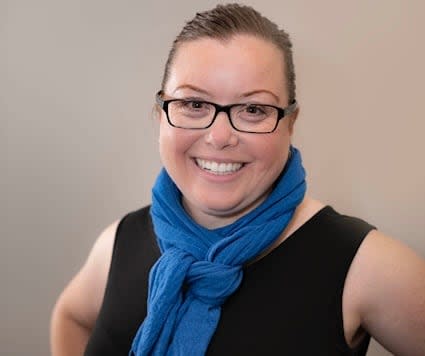This Ontario woman called a mental health hotline for help but was told no one was available

A St. Thomas, Ont. woman says she was turned away by a 24/7 mental health helpline that didn't refer her to any other programs to assist her with her anxiety.
Last week, Amanda Stark, 43, contacted Reach Out, a provincially funded information, referral, support and crisis service for individuals with mental health or addiction needs, and was told by a representative that her problems were "a lot" but that there was nobody available to help her.
"I answered all his questions and went through the scenario I was dealing with in the moment with my mental health and life. He basically took a moment and said 'Wow that's a lot' and went on to explain that he didn't have anybody I could talk to in that moment," Stark told CBC's London Morning.
Reach Out operates through Canadian Mental Health Association (CMHA) Thames Valley Addiction and Mental Health Services, and supports those living in London, Middlesex, Oxford and Elgin counties. It's funded by Ontario Health and provides system navigation, supportive listening and crisis services.
The situation is one the organization leading the program says it's taking very seriously. No one was available for an interview before publication, but in an email, a spokesperson expressed regret about Stark's experience.
"We're sorry to hear that Amanda's experience left her feeling unsupported; this is not how we want callers feel after speaking with Reach Out," wrote Kelly Morgan.
"Typically when someone calls Reach Out expressing concerns about self-harm or is experiencing a mental health crisis, our responders will provide supportive listening and validate their feelings while providing suggestions for safety planning or coping tools."
Stark said the person who answered her call, who was not a counsellor, asked her a series of intake questions about her previous experiences with self-harm or if she had been hospitalized before, to gauge her situation's intensity.
Although he was kind and friendly in his approach, Stark said it would've been helpful if he connected her to another service within the community that could better address her needs.
"He employed a couple things with the way he spoke to me and the words he used, that I could recognize were counselling-type supports in the moment, but I really could've used more."
CMHA expresses regret
If there are serious concerns about the caller's wellbeing, responders can take measures to ensure their safety, including directing them to the Crisis Centre, deploying a mobile response team, or connecting with first responders and local police to coordinate a wellness check, Morgan said.
Stark explained that she has a traumatic brain injury and is diagnosed with mild depression and anxiety that she manages through a low dosage of medication. While most days are manageable, there are some where her anxiety feels intense, leading her to seek support from Reach Out.
"I thought 'I'm not going to sit and deal with this anxiety on my own', I know there are community supports out there, so I called. I was just having a bad day and I could've used someone to talk to for a half-hour to just support and walk me through things," she said.
"Although [the responder] was equipped with skills like active listening and a calm demeanour, he himself was not able to offer me any kind of in-the-moment emotional support which is what I had hoped for."
Stark feels it's unfair there aren't enough services for people with mild forms of mental illness, except long wait-lists to see professionals in-person or a hospital visit, she said. A service paid for by the public's tax dollars should be better equipped, she added.

